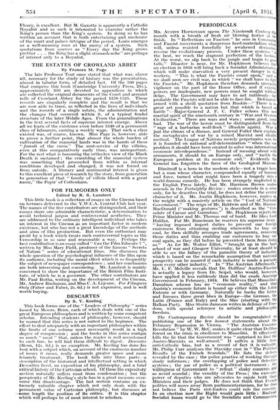PERIODICALS Ma. Atrstirr Honor-mom opens The Nineteenth Century thh month
with a breath of fresh air blowing hotter at the finish. In " Reflections on Fascism " he sees in Commumt and Fascist movements a dangerous herd-materialism which will, unless resisted forcefully by awakened democrats, reverse the evolutionary process. Under these systems at the best, we reach the stagnant perfection of the beehive. At the worst, we slip back to the jungle and begin to gime tails." Disaster is near, for Mr. Hopkinson believes the an election in 1936 will bring back a Socialist Administration, which will make starvation a very present danger to the workers. " This is what the Fascists count upon," and m we shall soon see civil war, in which " we shall have to fight the Fascists." Mr. Hopkinson therefore demands unceasing vigilance on the part of the Home Office, and if existing powers are inadequate, new powers must be sought without delay. The Government may have to act ruthlessly-_b0 probably the Fascists will not be able to face fire. Defensively armed with a shrill quotation from Ruskin—" There is no great art possible to a nation but that which is based on battle "—Major-General J. F. C. Fuller echoes this new martial spirit of the nineteenth century in " War and Western Civilization." There are wars -and wars ; some. good, some bad. The war of the heroic must be distinguished from the " rage of a barbarian wolf-flock " (Ruskin again). War is just the climax of a disease, and General Fuller then explains the metaphysics of war by a mixed Marxist and idealist method. The League of Nations merely perpetuates war, for it is founded on national self-determination when the one problem it should have been created to solve was international economic interdependence." Instead of messing about with armaments, it should fix on Europe only, and " tackle the European problem at its economic end." Evidently the General has forgotten the farce of the Geological Museum.
Dimitroff is a hero in the modern style—not a tragic hero, but a man whose character, compounded equally of humour and force, turned what might have been a tragedy into a world-famous comedy. He has been strangely neglected by the English Press lately, but Mr. Harrison Brown makes amends in the Fortnightly Review: makes amends in a sense only, for he describes the trial, he- does not define the central character of it. Mr. Austin Hopkinson, however, makes up the weight with a masterly article on the " Cost of National Government." The reign of Mr. Baldwin and of Mr. Ramsay MacDonald ("making gestures ") is described as the "Con- sulate of Caesar and Garrulous." Mr. Hopkinson rejects the Prime Minister and Mr. Thomas out of hand. He likes Lord Halifax. For Mr. Runciman he reserves his supreme irony: " having imposed import duties to prevent our foreign customers from obtaining sterling wherewith to buy our coal, he then skilfully arranges trade agreements, removing those duties and thus enabling our customers to buy our coal again, as they did before he prevented them from doing so." As for Mr. Walter Elliot, brought up in the hard school of war and Glasgow University, he at least should be able to see the fallacy of the parasitic theory of industry, which is based on the remarkable assumption that national prosperity can be assured if each industry is made a parasite upon every other industry." In " The Austrian Aftermath," Mr. C. F. Melville reveals that Dr. Dollfuss' Austro-Fascism is actually a legacy from Dr. Seipel, who would, however, have applied it less ruthlessly than did the crude Austrian Government in February, 1934. He believes that Mussolini's Danubian scheme has no " economic reality," and that Austria's economic future is bound up either with the Little Entente or with Germany. Naturally he backs the latter, and foresees three great blocs in Europe—the German, the Latin (France and Italy) and the Slav (starting with the Balkan Pact). Misi Storm Jamesonwrites in defence of Free- dom, with special reference to artistic and philosophic freedom.
The Contemporary Review should be congratulated on publishing one of the few -honest statements about the February Repression in Vienna. " The Austrian Counter- Revolution " by W. W. McC. makes it quite clear that Dollfuss forced on the crisis in obedience to Mussolini. It effectively kills the lie that the Government was " surprised to find the Austro-Marxists so well-armed." It suffers a little from anti-Catholic bias, but as a record of fact it is valuable. Mr. Philip Carr analyses the Stavisky case in " The Political Results of the French Scandals." He lists the defects revealed by the case : the police practice of working through shady informers ; the overlapping of police and detective systems ; the use of police as a political instrument ; the, willingness of Government to " refloat " shaky concerns and so avoid scandal ; the venality of the Press : the excessive yoiver of deputies who are advocates to cajole . both then Ministers and their judges. He does not think that French politics will move away from parliamentarianism, for he does -not believe the Paris riot-leaders could rule the countrY- In an election now the Right would gain little : ' Radioed' Socialist losses would go to the Socialists and Communists.








































 Previous page
Previous page